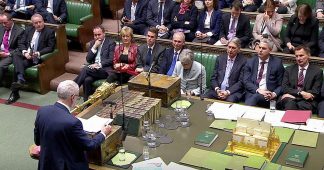Socialist critics of the EU won’t achieve a left-wing exit through a Tory deal which copperfastens neoliberal policies, argues Costas Lapavitsas.
By Costas Lapavitsas
21/10/2019
Johnson, despite his bluster, also wants to avoid such an outcome, and has focused from the start on delivering a deal. This could only mean a tweaked version of Theresa May’s deal, which was rejected three times by Parliament, but voted for by Johnson himself on the bill’s final reading, when he was on the backbenches.
May’s deal – leaving aside the complaints of the Remain camp – was a success for the British ruling bloc in the circumstances. Its legally binding component, the Withdrawal Agreement, kept the UK within the jurisdiction of the European Court of Justice (ECJ) for the transition period, and for four to eight years afterwards, in spite of the talk of ‘regaining control of our laws’. Thus, the legal overseer of the neoliberal evolution of the EU would remain operational in the UK for several years.
At the same time, the Withdrawal Agreement took the country out of the vacuous rigmarole of Brussels politics, saved the substantial net contribution to the EU budget, and effectively removed the service sector from the framework of the single market. With these compromises, the British ruling bloc could hope to protect its international position and its profits, while shelving the hugely divisive question of the EU for at least a generation.
The difficulty was, of course, Northern Ireland, which went straight to the heart of the issue of sovereignty. May’s solution was to create a ‘single customs territory’ uniting the whole of the UK with the EU with regard to trade in goods, thus avoiding a ‘hard border’ in Ireland. The ‘single customs territory’ inevitably had further legal implications, including the adoption by the UK of the restrictive EU regulations on state aid. These were also largely acceptable to the British ruling bloc since they acted as constraints on potential socialist policies.
The Political Declaration of May’s deal was a lesser, non-binding document that laid out broad terms for the future relationship between the UK and the EU after exit. It contained generalities about ensuring open and fair competition, thus developing the ‘level playing field’ on matters including state aid, social and employment standards, environmental standards and so on. It was similarly a guarantee against radicalism – of any sort.
Johnson’s proposal changes May’s deal in two important ways.
First, and crucially, it alters the position on Northern Ireland, the issue that ostensibly led to May’s failure. It abandons the ‘single customs territory,’ thus limiting the applicability of EU customs rules to Northern Ireland alone. Northern Ireland effectively remains in the customs territory of the UK, with a customs border created along the Irish Sea.
Since the rest of the UK is no longer in the ‘single customs territory,’ the Withdrawal Agreement is necessarily revised regarding VAT, state aid, and so on. Broadly speaking, its previous terms in these areas apply formally only to Northern Ireland. However, the core of the Withdrawal Agreement, allowing for the continuing power of the European Court over the UK for several years, remains unchanged.
Second, and also crucial, Johnson’s deal cuts through the generalities of May’s Political Declaration and proposes a ‘comprehensive and balanced’ Free Trade Agreement between the EU and the UK. It envisages ‘deep regulatory and customs’ cooperation and makes no bones about its uncompromising neoliberal outlook, especially Part I, Section XIV. To be sure, the Political Declaration is non-binding, but it leaves no doubt regarding the deregulatory intentions of the Johnson government on state aid, environmental protection, social and employment standards, and so on.
From the perspective of the British ruling bloc, Johnson’s deal is better than May’s. The European Court – legal bulwark of neoliberalism – retains a defining presence in the UK for several years. Northern Ireland, which has become an economic backwater for British big business, is reduced into further insignificance. The proposed Free Trade Agreement, negotiated by Johnson’s government, will deepen neoliberal deregulation. Above all, the vexed political issue of EU membership will be set aside, at last. If the British elite cannot stay in the EU – its preferred outcome – it can live with Johnson’s deal.
From the perspective of the EU, the preferred outcome would be for the UK to remain, possibly including a unilateral revocation of Article 50 by the British government. That would be a triumph for the neoliberal juggernaut of the EU, and a powerful lesson for others who wished to break out of the fold. The EU could also live with Johnson’s (or May’s) deal. However, a no-deal Brexit is a different proposition. On the one hand, it would do considerable damage to the German, Dutch and Irish economies. On the other, it would offer an opportunity to the French ruling bloc to try and substitute Paris for the City of London.
On balance, the preference of the EU would be to avoid no deal. Thus, the EU showed itself perfectly prepared to compromise by revising the Withdrawal Agreement, despite the earlier arrogant pretence that it could never be countenanced. That is a lesson for everyone who are considering how to deal with the EU in the future.
Finally, from the perspective of the left the worst mistake would be to reject Johnson’s deal, only to campaign foursquare for Remain. If the Labour Party fell into this trap, it would be decisively isolated from broad swathes of its working-class base, while putting an end to the prospect of socialist policies.
Rather, the left of the Labour Party ought to propose radical amendments to Johnson’s deal, including eliminating the role of the European Court, scrapping the neoliberal dreams of Johnson’s Free Trade Agreement, and clear terms allowing for industrial policy. There can no socialist radicalism today within the European Union. Even at this late hour, that message ought to be stated loud and clear.
Published at https://tribunemag.co.uk/2019/10/boris-deal-is-no-left-exit











